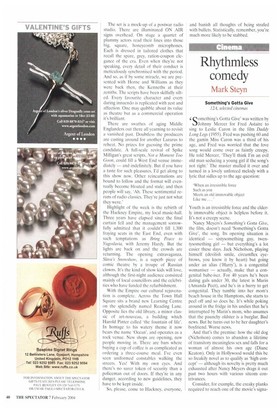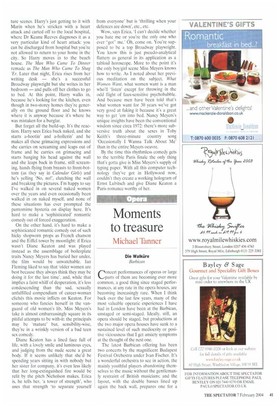Rhythmless comedy
Mark Steyn
Something's Gotta Give 124, selected cinemas
C omething's Gotta Give' was written by
0Johnny Mercer for Fred Astaire to sing to Leslie Caron in the film Daddy Long Legs (1955). Fred was pushing 60 and the gamin Miss Caron was a third of his age, and Fred was worried that the love song would come over as faintly creepy. He told Mercer, 'They'll think I'm an evil old man seducing a young girl if the song's not right.' The master mulled it over and turned in a lovely unforced melody with a lyric that sidles up to the age question:
'When an irresistible force Such as you Meets an old immovable object Like me ... '
Youth is an irresistible force and the elderly immovable object is helpless before it. It's not a creepy scene.
Nancy Meyers's Something's Gotta Give, the film, doesn't need 'Something's Gotta Give', the song. Its opening situation is identical — sixtysomething guy, twentysomething girl — but everything's a lot easier these days. Jack Nicholson, playing himself (devilish smile, circumflex eyebrows, you know it by heart) but going under an alias ('Harry'), is a congenital womaniser — actually, make that a congenital babe-iser. For 40 years he's been dating gals under 30, the latest is Mann (Amanda Peet), and he's in a hurry to get congenital. They tumble into her mom's beach house in the Hamptons, she starts to peel off and so does he. It's while poking around in the fridge in his undies that he's interrupted by Mann's mom, who assumes that the paunchy oldster is a burglar. Bad news. But he turns out to be her daughter's boyfriend. Worse news.
And that's the premise: how the old dog (Nicholson) comes to abandon a lifetime of transitory meaningless sex and falls for a woman of almost his own age (Diane Keaton). Only in Hollywood would this be so freakily novel as to qualify as 'high concept' — although its novelty is pretty much exhausted after Nancy Meyers drags it out past two hours with various sitcom contrivances.
Consider, for example, the creaky planks required to reach one of the movie's signa ture scenes. Harry's just getting to it with Mann when he's stricken with a heart attack and carted off to the local hospital, where Dr Keanu Reeves diagnoses it as a very particular kind of heart attack: you can be discharged from hospital but you're not allowed to return to your home in the city. So Harry moves in to the beach house. The Man Who Came To Dinner remade as The Man Who Came To Shag 'Er, Later that night, Erica rises from her writing desk — she's a successful Broadway playwright but she writes in her bedroom — and pulls off her clothes to go to bed. At this point, Harry walks in, because he's looking for the kitchen, even though in two-storey homes they're generally on the ground floor and he knows where it is anyway because it's where he was mistaken for a burglar.
But forget all the build-up. It's the reaction. Harry sees Erica buck naked, and she starts a-hootin' and a-hollerin' and he makes all these grimacing expressions and she carries on screaming and leaps out of frame and he carries on grimacing and starts banging his head against the wall and she leaps back in frame, still screaming, hands flying from breasts to front-bottom (as they say in Calendar Girls) and he's yelling 'No, no!', clutching the wall and breaking the pictures. I'm happy to say I've walked in on several naked women over the years and even occasionally been walked in on naked myself, and none of these situations has ever prompted the pantomime hysteria on display here. It's hard to make a 'sophisticated' romantic comedy out of forced exaggeration.
On the other hand, it's hard to make a sophisticated romantic comedy out of such hicky shopworn props as French chanson and the Eiffel tower by moonlight: if Erica wasn't Diane Keaton and was played instead as the assemblage of boilerplate traits Nancy Meyers has buried her under, the film would be unwatchable. Ian Fleming liked to say that 'older women are best because they always think they may be doing it for the last time', and, while that implies a faint whiff of desperation, it's less condescending than the sad, sexually unfulfilled compendium of career-woman cliches this movie inflicts on Keaton. For someone who fancies herself in the vanguard of old women's lib, Miss Meyers's take is almost embarrassingly square in its pitiful attempts to be with-it: the principals may be 'mature' but, sensibility-wise, they're in a wrinkly version of a bad teen sex comedy.
Diane Keaton has a lined face full of life, with a lovely smile and luminous eyes, and judging from the nude scene a great body. If it seems unlikely that she'd be spending years sitting in with nobody but her sister for company, it's even less likely that her long-extinguished fire would be relit by the pitch Nicholson makes. Erica is, he tells her, `a tower of strength', who uses that strength 'to separate yourself from everyone' but is 'thrilling when your defences are down', etc., etc.
Wow, says Erica, 'I can't decide whether you hate me or you're the only one who ever -got" me,' Oh, come on. You're supposed to be a top Broadway playwright. You know this is just pseudo-analytical flattery as general in its application as a tabloid horoscope. More to the point it's the only boy/girl scene Miss Meyers knows how to write. As I noted about her previous meditation on the subject, What Women Want, what women want is a man who'll 'listen' except for throwing in the odd flight of faux-sensitive psychobabble. And because men have been told that's what women want for 30 years we've got very good at faking it because it's a great way to get 'em into bed. Nancy Meyers's unique insights have been the conventional wisdom since circa 1972: there's more subversive truth about the sexes in Toby Keith's three-minute country song 'Occasionally I Wanna Talk About Me' than in the entire Meyers oeuvre.
By the time this rhythmless comedy gets to the terrible Paris finale the only thing that's gotta give is Miss Meyers's supply of typing paper. With all this computer technology they've got in Hollywood now, couldn't they create a working hologram of Ernst Lubitsch and give Diane Keaton a Paris romance worthy of her.



























































 Previous page
Previous page